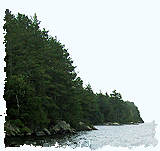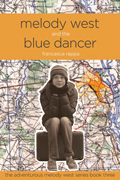Comments are closed.
Great Bear
 I just returned home from the most awesome summer vacation of my life! I traveled with my Aunt and Uncle and cousins up to Lake Temagami in northern Ontario, Canada and stayed two weeks at Camp Mukwa. Before I tell all about my vacation I’m happy to report that my best friend, Annie Pooler, and her family finally moved back to the neighborhood. For the past year Annie and her family were living in Washington, DC. When I saw Annie yesterday, I was so happy I had tears in my eyes. We decided to camp out in Annie’s backyard like we did last summer and stay up all night and talk. Camping with Annie was great. Annie’s brothers Johnny and Thomas were up to their tricks, but Annie and I handled the situation well. Let’s just say a creepy crawly made an appearance, and Mr. Pooler had to come outside and lay down the law.
I just returned home from the most awesome summer vacation of my life! I traveled with my Aunt and Uncle and cousins up to Lake Temagami in northern Ontario, Canada and stayed two weeks at Camp Mukwa. Before I tell all about my vacation I’m happy to report that my best friend, Annie Pooler, and her family finally moved back to the neighborhood. For the past year Annie and her family were living in Washington, DC. When I saw Annie yesterday, I was so happy I had tears in my eyes. We decided to camp out in Annie’s backyard like we did last summer and stay up all night and talk. Camping with Annie was great. Annie’s brothers Johnny and Thomas were up to their tricks, but Annie and I handled the situation well. Let’s just say a creepy crawly made an appearance, and Mr. Pooler had to come outside and lay down the law.
What about my vacation? Well, I learned and experienced many things. For one, I learned the forest around Lake Temagami is an ancient old-growth forest of red and white pine, and is home to many animals including bobcats and great horned owls and northern flying squirrels. Hardly any of the world’s original old-growth white and red pine forests remain, so the forest around Lake Temagami is an endangered ecosystem. The trees are more than one hundred and forty years old! When we arrived at the main dock on Lake Temagami where we were to catch our boat ride to Camp Mukwa, I couldn’t believe how thick the forest was and how deep the lake was. Finally our boat arrived, and I boarded the boat carefully and sat down on a comfy cushion in the back. I remember watching the dock get farther and farther away and then looking down at the choppy water and letting the cool, woodsy air blow against my face. I felt like I was the very first explorer to glide over the lake and see the surrounding wilderness. At that moment I knew I wanted to learn everything there was to learn about the wilderness and Lake Temagami!
First we headed for Bear Island, where the native people—the Ojibwa and Algonquin—live today. They are known as Deep Water People, because Lake Temagami in the Ojibwa language means “deep water by the shore.” Long before the explorers and trappers and settlers first arrived on Lake Temagami, these native people had fished and hunted on these very shores and had built their own communities. As the boat cruised forward, I wondered what life was like for these native people all those years ago. The rocking motion of the boat almost put me to sleep, but then I overheard something that would set in motion the greatest adventure of my life!
I overheard a conversation between two native people.  One of them, Charlie Paul, would later become my friend. I listened to what Charlie Paul had to say. He said he had seen a seven-foot black bear, known as the Great Bear. Black bears only reach six feet, so I knew at once this Great Bear was unusual. Charlie Paul insisted the Great Bear had roamed the forest around Lake Temagami for years and years. The Great Bear had one other unusual feature. In addition to his large size and his long life, the Great Bear had a lightning streak of white fur across his chest and was awesome to behold. Charlie Paul said only one who was pure of heart and mind and body and spirit could look directly into the face of the Great Bear and live to tell of it. I knew right then I might get the chance to see this Great Bear with my own two eyes. I knew this because black bears normally eat berries as part of their diet in the summertime, but because of a late spring frost, the berry crop hadn’t formed on the bushes. Since bears can smell garbage and compost from a mile away, many black bears were coming into the camps around the lake looking for food. I asked myself, “What if the Great Bear came to Camp Mukwa looking for food? Would I see him? Would I live to tell about it?”
One of them, Charlie Paul, would later become my friend. I listened to what Charlie Paul had to say. He said he had seen a seven-foot black bear, known as the Great Bear. Black bears only reach six feet, so I knew at once this Great Bear was unusual. Charlie Paul insisted the Great Bear had roamed the forest around Lake Temagami for years and years. The Great Bear had one other unusual feature. In addition to his large size and his long life, the Great Bear had a lightning streak of white fur across his chest and was awesome to behold. Charlie Paul said only one who was pure of heart and mind and body and spirit could look directly into the face of the Great Bear and live to tell of it. I knew right then I might get the chance to see this Great Bear with my own two eyes. I knew this because black bears normally eat berries as part of their diet in the summertime, but because of a late spring frost, the berry crop hadn’t formed on the bushes. Since bears can smell garbage and compost from a mile away, many black bears were coming into the camps around the lake looking for food. I asked myself, “What if the Great Bear came to Camp Mukwa looking for food? Would I see him? Would I live to tell about it?”
For two weeks I thought about the Great Bear and enjoyed life at Camp Mukwa with my cousins. Day after day we enjoyed swimming and canoeing and fishing. Night after night we enjoyed bonfires and told stories and played games. My favorite pastime was stargazing. I had learned from my next-door neighbor back in Maplewood that the faint shining band that arches across the sky is called the Milky Way, and that the Milky Way is part of the spiral galaxy that contains our sun. The amazing thing is the universe is made up of billions and billions of galaxies, and each galaxy is made up of billions and billions of stars! Well, you can imagine how star-filled the nighttime sky was up at Lake Temagami! Every night I gazed at constellations like the Big Dipper and saw many shooting stars, and with each passing night the moon got fuller and fuller.
My cousin Jack is a talented artist, and one afternoon we went to the general store on Bear Island so we could see the art objects made by the Inuit and other native peoples from all around Canada. Who are the Inuit? The Inuit are people who settled in the Canadian Artic, Alaska, and Greenland in the vast, treeless plains of the tundra. Long ago the Inuit were nomadic, which means they followed seals and walruses and caribou across the land in different seasons and hunted them. Today the Inuit live like we do, and many are artists who carve beautiful animals out of stone. At the general store we saw many beautiful things. We saw moccasins, tan leather vests with beads and fringe, a carved wooden bookmark in the shape of a swimming loon, and a piece of sculpture with the body of a man and the head of a squirrel. But the best part is we met a young woman named Lucy, and Lucy invited us to her cabin to see a carving of a dancing polar bear made by a famous Inuit artist.
We had to go to Lucy’s cabin on the sly, because Uncle Bill wouldn’t give us permission to go. It was our last evening at Camp Mukwa, and Uncle Bill wanted us to go to the bonfire with the rest of the family and listen to a man from Bear Island play the fiddle. We told Uncle Bill we were going back to the cabin to pack, but instead Jack and I set out along the path that wound along the water’s edge and headed directly for Lucy’s cabin on the far side of the island. Jack brought along his drawing of a fox and a hare and his drawing of a fish so he could show them to Lucy and her artist friends. We arrived at Lucy’s cabin and Jack showed her his drawings. Lucy was so amazed at how beautiful Jack’s drawings were she traded an Inuit print of a raven for them. Since we didn’t have Uncle Bill’s permission to visit, Lucy thought it would be best if we return to our cabin right away. It was on our way back to our cabin that we came face to face with our destiny!

I end my tale and leave you with the image in your minds of the Great Bear and his legend, in the hope that all of us can learn to respect the creatures of the earth, great and small.
~ mTw ~
Filed under | Comments Off on Great Bear



